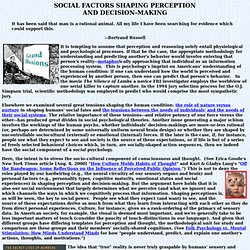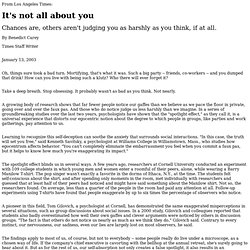

A SOCIOLOGICAL SOCIAL PSYCHOLOGY: SOCIAL FACTORS SHAPING PERCEPTION AND DECISION-MAKING. Elsewhere we examined several great tensions shaping the human condition: the role of nature versus nurture in shaping humans' social fates and the tensions between the needs of individuals' and the needs of their social systems.

The relative importance of these tensions--and relative potency of one force versus the other--has produced great divides in social psychological theories. Another issue generating a major schism involves the workings of the human psyche, whether individuals' decision-makings are more-or-less rational (or, perhaps are determined by some universally uniform neural brain design) or whether they are shaped by uncontrollable sociocultural (external) or emotional (internal) forces.
Here, the intent is to stress the socio-cultural component of consciousness and thought. The idea that "true" reality is never truly graspable by humans' sensory and cognitive equipment goes back at least to the works of Plato. Consider the social construction of sensory distinctions. How to Hack Your Brain.
How To Train Yourself To Be In The Mood You Want. Dec 27, 2010 When you have major changes going on in your life, or you’re just frustrated about where you are, it’s easy to get trapped in a cycle of depression, bad moods and frustration.

I know, I’ve been there … and when I’m not careful, I still get there more than I want to. But when I’ve had a particularly hard time, I hit these moments where I’m in a foul mood, or I’m just feeling paralyzed, and I’m just stuck. Sometimes I just stew in that and stay there, but sometimes I actually get intelligent and pull my way out of it. I’m going to outline the framework that I’ve been using successfully to really get myself resourceful and motivated (and in a better mood) when I’m feeling stuck. First Up: Using A Framework to Escape From Paralyzing Emotions When we feel bad, it’s hard to “feel good” again.
The reason for this is that steps take the emotion out of our situation and give us direction to simply act.
Psychological ("personality") Types. Psychological ("personality") Types According to Jung's theory of Psychological Types we are all different in fundamental ways.

One's ability to process different information is limited by their particular type. These types are sixteen. People can be either Extroverts or Introverts, depending on the direction of their activity ; Thinking, Feeling, Sensing, Intuitive, according to their own information pathways; Judging or Perceiving, depending on the method in which they process received information. Extroverts vs. Welcome to Adobe GoLive 6. From Los Angeles Times: It's not all about you Chances are, others aren't judging you as harshly as you think, if at all.

By Benedict Carey Times Staff Writer January 13, 2003 Oh, things sure took a bad turn. Take a deep breath. A growing body of research shows that far fewer people notice our gaffes than we believe as we pace the floor in private, going over and over the faux pas. Learning to recognize this self-deception can soothe the anxiety that surrounds social interactions. The spotlight effect blinds us in several ways. STEPHEN FRY: WHAT I WISH ID KNOWN WHEN I WAS 18 on Vimeo.
Abilene paradox. In an Abilene paradox a group of people collectively decide on a course of action that is counter to the preferences of many of the individuals in the group.[1][2] It involves a common breakdown of group communication in which each member mistakenly believes that their own preferences are counter to the group's and, therefore, does not raise objections.

A common phrase relating to the Abilene paradox is a desire to not "rock the boat". Explanation[edit] The term was introduced by management expert Jerry B. Harvey in his article The Abilene Paradox: The Management of Agreement.[3] The name of the phenomenon comes from an anecdote in the article which Harvey uses to elucidate the paradox: On a hot afternoon visiting in Coleman, Texas, the family is comfortably playing dominoes on a porch, until the father-in-law suggests that they take a trip to Abilene [53 miles north] for dinner. This anecdote was also made into a short film[4] for management education. Research[edit] See also[edit] Watch Free Documentaries Online. The Scientific Method in Psychology. PonderAbout.com. List of unsolved problems in philosophy. This is a list of some of the major unsolved problems in philosophy.

Clearly, unsolved philosophical problems exist in the lay sense (e.g. "What is the meaning of life? ", "Where did we come from? ", "What is reality? " Meaninglessness. MEANINGLESSNESS and EXISTENTIAL DEPRESSION "It is here that we encounter the central theme of existentialism: to live is to suffer, to survive is to find meaning in the suffering.

" - Victor Frankl Talk about it: info@livereal.com. SCHOPENHAUER'S 38 STRATAGEMS, OR 38 WAYS TO WIN AN ARGUMENT. Arthur Schopenhauer (1788-1860), was a brilliant German philosopher.

These 38 Stratagems are excerpts from "The Art of Controversy", first translated into English and published in 1896. Carry your opponent's proposition beyond its natural limits; exaggerate it. The more general your opponent's statement becomes, the more objections you can find against it. Hedgehog's dilemma. Both Arthur Schopenhauer and Sigmund Freud have used this situation to describe what they feel is the state of individual in relation to others in society.

The hedgehog's dilemma suggests that despite goodwill, human intimacy cannot occur without substantial mutual harm, and what results is cautious behavior and weak relationships. With the hedgehog's dilemma, one is recommended to use moderation in affairs with others both because of self-interest, as well as out of consideration for others.